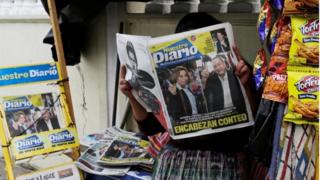Home » Latin America »
Insecurity top concern as Guatemalans head to vote
Guatemalans head to the polls on Sunday to choose their new president.
The two candidates who have made it into the run-off having stood for the presidency repeatedly before.
Ex-first lady Sandra Torres hopes it will be third time lucky for her while ex-prison chief Alejandro Giammattei is running for the fourth time.
Guatemalans have cited insecurity as their main concern followed by unemployment, high living costs and corruption.
How does it work?
The president is elected for a single four-year term. Current president Jimmy Morales cannot stand for a second term.
As none of the 19 candidates in the first round held on 16 June got the 50% of votes needed to win outright, the top two candidates progressed to a second and final round.
The one to win the most votes on Sunday will become president and take up office in January 2020.
Who are the contenders?
The former first lady failed in her two previous attempts to be elected president but won the first round of voting with 26% of the votes.
Ms Torres was married to Álvaro Colom, who governed Guatemala from 2008 to 2012, and who is currently under investigation for alleged fraud.
She divorced him in 2011 in order to bypass a law which banned close relatives of the president from succeeding him. At the time she said that “I’m divorcing my husband but I’m getting married to the people”. She also said she had found it “very difficult” to leave her “loving marriage” to Mr Colom.
In the 2011, her candidacy was rejected by the Constitutional Court but she was allowed to run in 2015. That time, she had enough votes to get her into the second round where she was defeated by Jimmy Morales by a large margin of almost 35 percentage points.
Ms Torres is running for the social-democratic National Unity of Hope party (UNE). She and her party are under investigation for alleged illegal campaign financing during the last election, which she has denied.
Polls suggest Ms Torres is popular with voters in rural areas of Guatemala because of her former husband’s social programmes but in urban areas the corruption allegations have hit her hard.
Ms Torres says she will provide “comprehensive solutions like development, fight against poverty and job opportunities”.
The 63-year-old candidate is standing for the right-wing Vamos (Let’s Go) party and this is his fourth attempt at becoming president. Each time, he has run for a different party.
Mr Giammattei is a trained doctor who was named director of the Guatemalan prison system in 2006.
That same year, he led a controversial operation to take control of the Pavón prison, which had been run by inmates for a decade. Seven inmates died during the raids by the security forces.
Mr Giammattei was among eight people accused over the incident and after spending 10 months in pre-trial detention, he was acquitted due to lack of evidence.
He came fourth in the 2015 election.
If he is elected, he says, he will build “a wall of prosperity” to keep Guatemalans from migrating to the US. In order to lessen the disparity between the rich and the poor, he wants to attract more foreign investment to Guatemala by strengthening the protections granted to private property.
What are the main issues?
Guatemalans have told pollsters that their top concern is insecurity saying that tackling high crime rates and armed attacks should be the priority for whoever wins the election.
Ms Torres said she would deploy the armed forces to combat crime and move jails out of urban areas. She also suggested making inmates work and investing the money they earn in schools.
She has said she would try to increase the minimum sentence for extortion at 20 years in prison.
Mr Giammattei said he would back to a bill to declare gang members “terrorists” so that if imprisoned they would have no right to conjugal visits and would be forced to work in jail.
Both candidates say they oppose a migration deal signed by outgoing President Jimmy Morales under which migrants passing through Guatemala en route to the United States would have to apply for asylum in the former rather than in the US.
The two candidates argue that Guatemala does not have the capacity to process the asylum requests and even less so to look after the applicants or return them to their home countries if their requests are rejected.
President Morales signed the “Safe Third Country” agreement on 27 July, just days after US President Donald Trump had threatened Guatemala with tariffs and other sanctions.
Why is there little enthusiasm around these polls?
The run-up to the election was overshadowed by the fact that the two favourites to win were prevented from standing in the poll.
The former attorney-general, Thelma Alana, and Azury Ríos, the daughter of the late military ruler, Refrain Ríos Mont were barred from running by Guatemala’s constitutional court angering those who were planning on voting for them.
Many Guatemalans are also fed up with the corruption scandals which have rocked the country.
Four years after large-scale anti-corruption protests forced then-President Otto Perez Molina to resign, many feel not enough has been done by the government of Jimmy Morales to combat corruption.
Corruption remains one of the top three issues voters want to see tackled but neither Mr Giammattei not Ms Torres have said whether they plan to renew the mandate of the UN’s International Commission against Impunity in Guatemala, which is due to expire in September.
Source: Read Full Article



